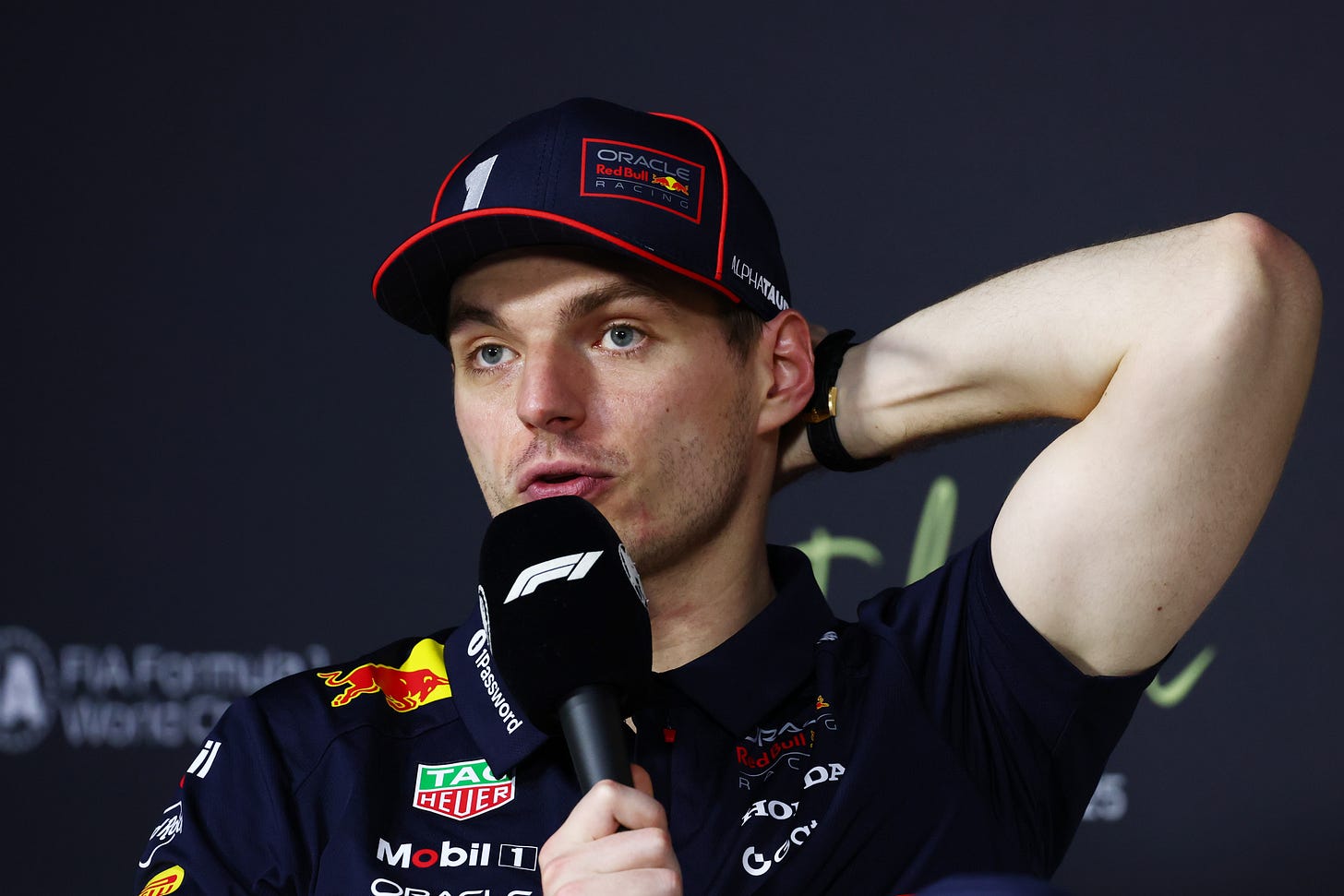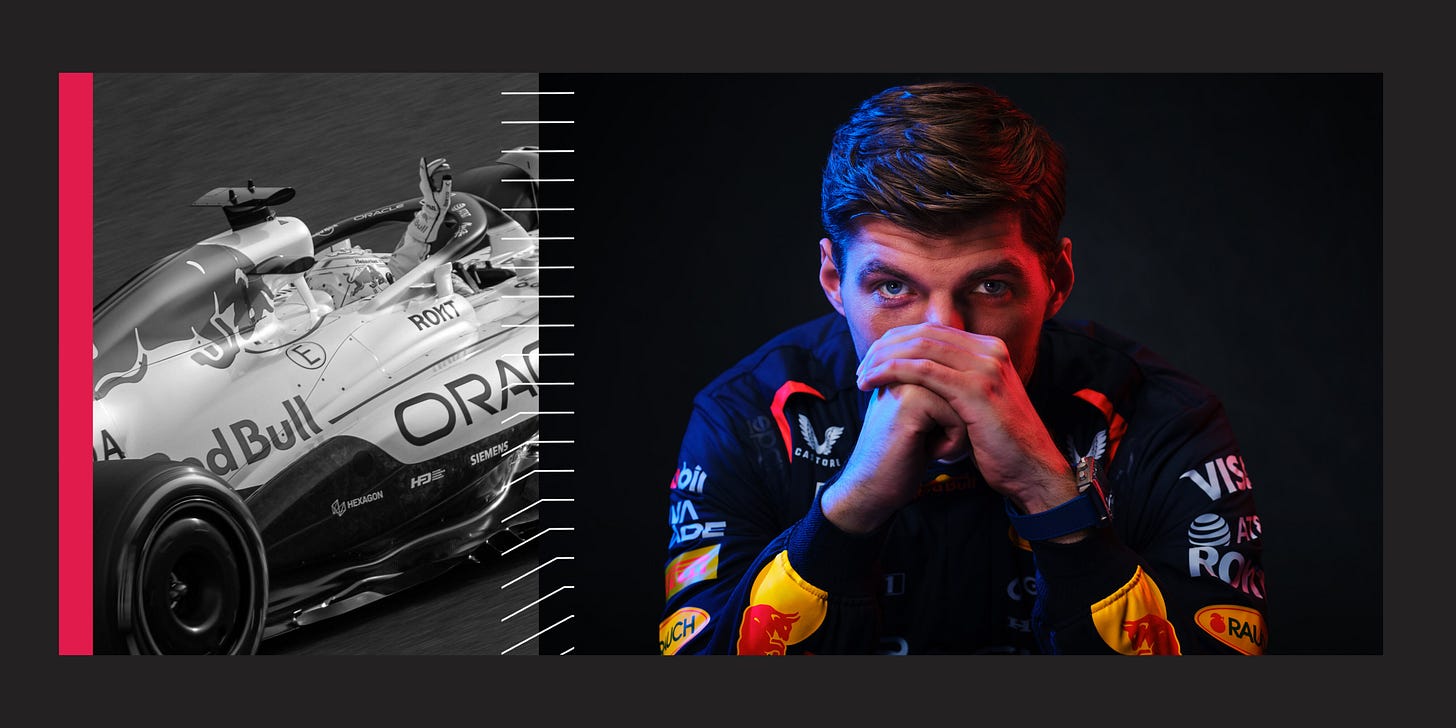Checkered Reputations: Part Two - Verstappen’s ruthless pursuit keeps fans engaged
As Formula One evolves into a global spectacle, Max Verstappen remains a throwback to pure racing, divisive, dominant, and impossible to ignore.
Anyone but the Dutchman in car number one, that was the sentiment among fans heading into 2024. After all, Max Verstappen had smoked the grid the year before.
Verstappen was in a class of his own in 2023, winning 19 of the 22 Grands Prix. The inevitability of hearing the Dutch national anthem every Sunday was beginning to wear thin for some viewers.
Fans warned that such dominance could lead to a drop in viewership, and numbers did drop marginally in the UK. Sky’s dedicated F1 channel saw its average monthly audience fall by 6% in 2023, from 3.62 million in 2022 to 3.40 million.
46% of fans did not want a repeat of 2023 and hoped to see a closer fight in 2024.
McLaren challenge Verstappen
Red Bull faltered after a dream start. The Milton Keynes outfit had to rely on Verstappen’s brilliance to secure a fourth consecutive drivers' championship and fend off an increasingly competitive McLaren.
The 2024 season was one of the most competitive campaigns, with seven different drivers being crowned race winners.
"More people are watching F1 than ever before," Formula one said regarding its 2024 viewership. However, it did not release complete viewership figures.
The 2024 season saw 10 new attendance records and 17 sold-out events, with Formula One registering a campaign attendance record of 6.5 million season attendees, compared to 6 million the previous year.
McLaren's engineering leap turned Lando Norris into a serious challenger. With Verstappen now in the inferior car, the Red Bull driver had to defend his diminishing points margin. Fans knew what was coming next: Verstappen was going to get his elbows out. The inevitability of the Sunday Dutch national anthem was going to be replaced by gasps generated by on-track incidents.
Verstappen’s ‘bad boy’ appeal
“There is always the appeal of a supposed ‘bad guy’ or flawed genius, so I’m sure Verstappen plays a role in keeping fans interested,” says Dr. Damion Sturm, Senior Lecturer in Sport Management at Massey University in New Zealand.
“Fortunately, in 2024 he no longer seemed to have the best car at his disposal, so had to get his ‘elbows out’ to fend off Lando Norris - quite unequivocally and ruthlessly at times which made for a great spectacle,” Dr. Sturm tells The Asterisk. The expert co-edited the book, The History and Politics of Motor Racing: Lives in the Fast Lane.
The most intense point of friction between Verstappen and Norris came in Austria.
Dr. Sturm expects Verstappen to be involved in more on-track incidents this year with an inferior car.
“Currently he is really needing to push the car just to get on the podium or even to get any decent points, so is likely to continue to be feisty with some of the mid-field runners on occasions.”
‘The only place that matters is first’
Verstappen, however, demonstrated that he can achieve big results when Red Bull is not the quickest. His qualifying lap and win in Suzuka will go down in the history books. It was exactly the kind of victory Swiss luxury watchmaker Tag Heuer was betting on.
The Dutchman is one of the faces of Tag Heuer’s latest ‘Designed to Win’ campaign. The marketing featured a picture of Verstappen with the caption, “The only place that matters is first.”
Give Verstappen a competitive car, and you can bet he’ll be looming large in the leader's rearview mirrors.
Verstappen has often been compared to Formula One greats like Michael Schumacher and Ayrton Senna.
“Like Fernando Alonso and Lewis Hamilton were before him, he is a generational talent but also has some of Michael Schumacher’s elements to him as well,” says Dr. Damion Sturm. “He is immensely talented and can do exceptional things in the car,” he continues, referring to Verstappen’s thunderous drive at the wet 2024 Brazilian GP, where the Dutchman obliterated the field, a quality that resonates with Schumacher's traits as the 'rain-master.'
“And yet he often still crosses the line.”
Pushing it to and beyond the limit
“Hamilton and Alonso can certainly be ruthless and cunning, but I’m not sure they really crossed any lines on the track too often or overtly anyway.”
Former Ferrari and Williams team manager Peter Windsor argued that Verstappen’s spatial awareness and ability to exploit loopholes are what make him a world champion. However, the Dutchman’s on-track manoeuvres have few fans.
“Verstappen’s defensive driving to prevent a pass (or to force himself by) can often be marginal if not exceeding the limits of fair driving. Indeed, it even resulted in an unofficial ‘Max Verstappen’ rule around how aggressively drivers can move to defend a pass to clarify what is and is not acceptable.
“Again, Verstappen is often right on that limit, crosses it (or forces it to be redefined), as Schumacher would do at times in the past.
“Moreover, both of these champion drivers essentially have had the team set up around them and always willing to defend them to the press despite what are or can be publicly perceived as indiscretions, unfair practices or downright dangerous driving.”
Verstappen has, and will continue to, stoke controversy with his methods. Does he care about what fans think of how he operates? Formula One aficionados already know the answer: He doesn’t.
Mess with the (Red) Bull, get the horns
Verstappen has one clear objective: to win. At what cost? Tune in to a Grand Prix to find out. Mess with the (Red) Bull, and you’ll get the horns.

But what is it about personas like Verstappen, whether it’s his cold dominance or the controversy surrounding his approach, that makes him such a compelling figure?
“So, yes, there is the ability to dominate that champion drivers have when the car and team are set up around them, are at their disposal and seemingly operate as a well-oiled machine or the car simply as an extension of themselves.
“There is always the mystery of is it the man or machine capable of such feats?, or indeed, have they become machine-like (or robotic) in their performances, dominance and abilities,” he speaks of moments when Verstappen has appeared one with the car, a rare feat in motorsport.
Verstappen’s impact on F1’s global appeal
According to Chief Commercial Officer Emily Prazer, one in three fans began following Formula One in the last five years, and characters like Verstappen contribute to the sport's appeal.
“Controversies make things more interesting for global audiences,” says Dr. Sturm, whose areas of interest include and are not limited to sport sociology, stardom, celebrity and persona; audiences and fan cultures. “Particularly the more fair-weather or casual fans, as opposed to the monotonous dominance of one driver destroying the opposition and even lapping many of his rivals at races which sees global audiences turn off.
“The fact that his championship win over Hamilton in 2021 was so contentious and shrouded in controversy, further adds to the myth and lure of Verstappen, including those who tune in hoping to see him fail or who operate as anti-fans as a result.”
This is what made the second half of the 2024 season even more intriguing. According to psychology expert Dolf Zillmann’s Affective Disposition Theory, when fans choose a side, their emotional investment in the competition becomes significantly stronger.
Verstappen’s growing resentment toward F1’s changes
Dr. Sturm argues that the sport would become boring if all the drivers were robotic and acted as corporate shills.

“Verstappen is so wrapped up in racing and performance that he tends to shun the other aspects of Formula One stardom. For example, he visibly seemed less than impressed at how F1 operated at the new US races in Miami and Las Vegas – nonplussed at the focus on entertainment, gimmicks and showmanship with grandiose entrances and razzmatazz,” he says, adding that the Dutchman later obliged with the clichéd "Viva Las Vegas" radio message after taking victory in the inaugural race.
“In many ways, he seems to embody a throw-back to the ‘pure racer’ solely focused on racing, performance and fine-tuning his craft, not without his flaws of character or judgement, which also humanises him and helps him appeal to many motorsport fans, or those wishing him to fail.”
Verstappen isn’t a fan of Formula One’s commercial direction. He has been a vocal critic of the increasingly dense and expanded calendars, rising commercial commitments, and the changing race formats.
Future of Verstappen in Formula 1
The Dutchman has made it clear that he won’t stay in the sport for long if F1 continues to make drastic changes. In 2023, he stated that it wasn’t “in the DNA of Formula 1” to have sprint races.
In a video introducing the 2025 driver line-up, Verstappen shared what he loved about being a racing driver.
"The driving bit," he said. "I fell in love with racing in a go-kart, low to the ground, high speeds. For me, that's the best. Qualifying, low fuel, that's what I enjoy. And most of the other things, I don't like," he laughed.
The Dutchman's first-lap antics at the Saudi Arabian GP last week added much-needed drama to what would have otherwise been a snoozefest.
McLaren’s Oscar Piastri got a better start from P2 on the grid and would likely have sailed to a comfortable victory. The Australian claimed the corner at Turn One, squeezing Verstappen off-track, who then overtook the McLaren driver.
Verstappen was handed a five-second penalty for leaving the track and gaining an advantage. The main narrative of the race shifted to whether Red Bull could engineer a better strategy to keep the McLaren at bay.
The Dutchman was not pleased with the penalty and refused to comment on it in the post-race interviews. Verstappen stated that it was better to stay quiet, as “people cannot handle the truth,” and that he could get into trouble for speaking his mind.
Verstappen's post-race behavior was a subtle dig at the FIA. The president of the motorsport governing body, Mohammed Ben Sulayem, has been accused of attempting to suppress criticism.
The four-time world champion won’t walk away just yet, but the list of things he resents about modern Formula One is growing. When Nico Rosberg shocked the world by retiring after winning the 2016 title, it came out of nowhere. If Verstappen were to do the same, it wouldn’t be nearly as surprising, not while the sport slowly loses its soul in his eyes.
Stay tuned for Part Three: If you don't have a Verstappen or Hamlin, something's wrong with your sport.
Read Part One here:
Checkered Reputations: Part One - Hamlin stirs NASCAR’s storm with unapologetic flair
“Really?” the commentator watched in disbelief.



